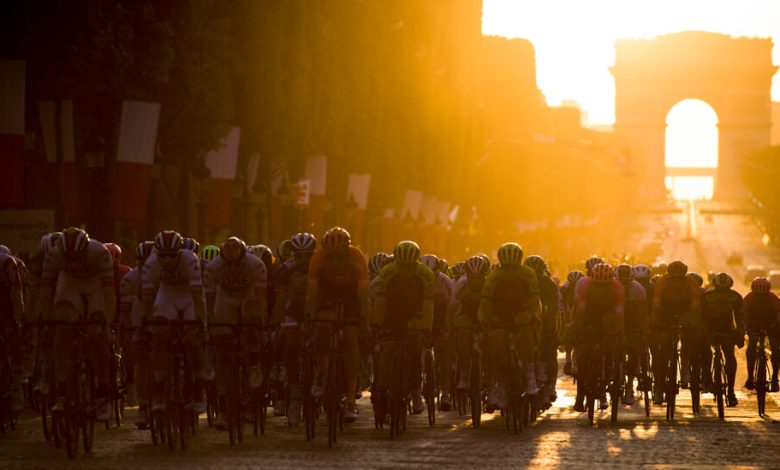Tour de France Route Steers Clear of Olympics, and Paris

Everything makes way for the Olympics. Even an event as important to the host nation as the Tour de France.
Because the 2024 Summer Games will be taking over Paris starting on July 26, the men’s Tour de France — the world’s most famous cycling race — will relocate its traditional finish this year, ending not in Paris but in Nice on July 21. The women’s race, an eight-stage event that typically starts just after the end of the three-week men’s race, will be pushed back to Aug. 12, after the Olympics conclude on Aug. 11.
Race organizers announced the routes on Wednesday in Paris.
Ending the race somewhere other than Paris is a major departure. After decades of finishing at the Parc des Princes Stadium near the Bois de Boulogne as well as the Bois de Vincennes, the Tour in 1975 began a tradition of concluding with several laps on the Champs-Élysées. The day often provides some of the race’s most iconic images: riders racing loops in a tight pack, crowds of spectators jamming the streets, the famous Arc de Triomphe as a backdrop.
When the Olympics comes to town, though, they fill a city’s hotels, restaurants, roads, stadiums and arenas, and dominate the attention of most sports fans and the security services. For those reasons, major sporting events, even in non-Olympic sports, are mostly kept away from host cities in the weeks surrounding the Games. In 1996, for example, the Atlanta Braves baseball team embarked on a 17-game, 20-day road trip while the Summer Olympics went on in their home city.
The Tour plans a different route every year, and it had previously announced some of this year’s featured changes, including the finish in Nice and a start in Italy.
It is not uncommon for the Tour to begin in another country; it has done so six times in the last 10 years. Next year, the men’s Tour will start in Italy for the first time since its inception in 1903. The opening stage will travel east from Florence to Rimini on June 29, with Stages 2 and 3 in Italy as well before the race enters France.
The final leg, from Monaco to Nice, will be a time trial for the first time since 1989, when the American Greg LeMond overcame a 50-second deficit to Laurent Fignon and won the race’s overall title by eight seconds, the closest margin in history.
In between, the route this year will include the usual collection of flat stages, high mountain climbs and stages that blend both challenges. And even without a swing into Paris, it will visit some familiar sites.
After entering France, the race will circle the country counterclockwise, reaching the difficult climbing of the Alps almost immediately in Stage 4, which features the grueling ascent of the Col du Galibier. After some flatter stages, the Tour will reach the Pyrenees in the southwest before returning to several extremely difficult days in the Alps and then the finish in Nice.
There will be an unusual feature in Stage 9 near Troyes as riders, who normally ride on paved roads, will face 14 sections of racing over gravel.
Many of the riders in the Tour next year will go on to race at the Paris Olympics as well. At the Tokyo Olympics in 2021, Tadej Pogacar of Slovenia followed a Tour de France win with a bronze medal in the Olympic road race. Jonas Vingegaard of Denmark has won the Tour de France the past two years.
The women’s race will begin in the Netherlands, home of the defending champion, Demi Vollering, and then travel to Belgium before entering France. From there, the race’s final three stages will travel south down the eastern side of France before finishing on the eighth and final stage with a potentially spectacular, and critical, climb up L’Alpe d’Huez.
The 2024 Tour will be broadcast on NBC channels and streamed on Peacock for viewers in the United States.




